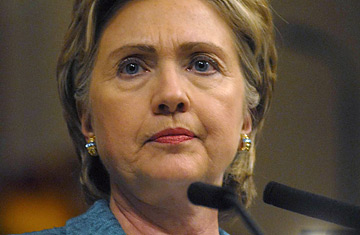
Hillary Clinton
Last June, Hillary Clinton's campaign gave back $7,000 to Chinese restaurant workers who contributed $1,000 apiece for a political fund-raiser. It was her campaign's effort to stop a common campaign-finance abuse: the use of proxies by well-heeled donors trying to get around the $1,000 limit on campaign contributions. But however well intentioned, the effort points up the difficulty all of the presidential campaigns have in trying to police their political contributions.
The problem, in the eyes of the Clinton campaign, was that the low-paid restaurant workers did not seem capable of affording $1,000 donations — and thus, it appeared likely, may have been used as proxies by other big donors. Yet the Clinton campaign did not reimburse another 15 restaurant workers — including cooks, waiters, a dishwasher and cashier — who also wrote checks for the April 13 event in New York's Chinatown. Nor did it send back money from a garment worker and phone card clerk, not to mention 15 donors who had failed to list any occupations or register to vote.
The situation is complicated by the nature of Chinatown economies, which are built almost entirely on cash transactions, tremendously high savings rates and a tradition of financial secretiveness. Few Chinese-American workers in New York City's several Chinatowns will reveal how much they really make. At the same time, it is not uncommon to see waiters and dishwashers among other so called menial workers who are capable of paying for cars, plunking down large initial premiums for insurance policies or making sizable down payments on homes or apartments — in cash. The banks of Chinatown centered in Canal Street in Manhattan have combined deposits of $6 billion, behind only the ritzy Upper East Side ($8 billion) among New York City neighborhoods. Chinatown residents say it would not be surprising that waiters and garment workers could afford to make political donations in the $1,000 range.
That creates a particular problem in trying to figure out which donations are being funneled through proxies. Fund-raisers face pressure to gather large numbers of checks but have no responsibility to screen them. Fugitive businessman Norman Hsu drew attention to the $850,000 he bundled for Clinton because of some of the donations came from people of modest means. In August, two Michigan lawyers were indicted on charges of soliciting and reimbursing proxy donors who contributed $125,000 to John Edwards' 2004 presidential bid.
Yet there are few requirements intended to prevent such abuses. Campaigns are supposed to obtain home addresses, jobs and employers for everyone who gives more than $200, and to make "best efforts" to fill in missing information. Yet what they do with the data — or a contributor who fails to produce it — is left to their discretion. The Clinton camp did more than it was required to when it refunded a handful of contributions from its $380,000 fund-raiser in April. But the criteria for which contributions were returned and which were kept remains somewhat mysterious. Why did the Clinton campaign, for example, send back a check to Liu Zeng, but not to Lee Sang Cheung, who each gave $1,000 to the campaign and fit the same demographic and voter profile?
Clinton spokesman Howard Wolfson wouldn't discuss individual donors. But he shed light on the general procedure. He said the provenance of 15 contributions was initially questioned in an ongoing review by the campaign's "compliance team." Income was the criterion — dishwashers, waiters and cooks were flagged.
The suspect donors were asked in a letter in June to confirm that the money was their own. Eight confirmation letters came back signed, and their money was kept. Seven did not respond, and their money was returned — even though, Wolfson admits, the donors might not have received the letter, understood it or felt like responding. "We obviously wanted to go above and beyond," he said.
It is hard to expect more from financially strapped campaigns, said Sheila Krumholz, of the Center For Responsive Politics. But given the implausibility of $1,000 contributions by dishwashers and cooks — at least to people outside Chinatown — she suggested that "ideally they would go beyond the letter of the law and not accept something so willingly that is dubious regardless of what these folks say." She added: "When you're delivering the fund raising job to a bevy of bundlers, you need to make sure the procedures are tight. It really is incumbent on the candidates, campaigns and political parties to bring out the magnifying glass. If they don't do it, and they are accepting contributions of dubious origin, they deserve what they get — a lot of mistrust."
In fact, Clinton's campaign ranks first among leading Democratic primary candidates in reporting of donor information — 93.3% of contributions came in with full disclosure, according to an analysis by Krumholz's watchdog group, compared with 90.5% for John Edwards and 83% for Barack Obama. The Clinton campaign also was the most forthcoming in describing its vetting methods. Obama spokesman Bill Burton said, "We make our best effort" to root out problems with donors, but he declined to specify the efforts. Likewise, Edwards spokeswoman Colleen Murray said that "every reasonable precaution" is taken to ensure the legality of her campaign's donors. The campaign did not answer when asked to describe those precautions. With reporting by Howard Chua-Eoan
